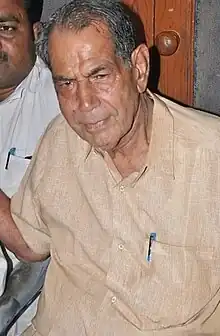Banwari Lal Sharma
Banwari Lal Sharma is a veteran Indian politician having served in politics for over 50 years and has defeated the likes of Vasundhara Raje.[1][2] He served as a minister from Rajasthan belonging to Indian National Congress. He was a legislator of the Rajasthan Legislative Assembly. [3]

Banwari Lal Sharma | |
|---|---|
| Member of the Rajasthan Legislative Assembly | |
| Constituency | Dholpur Assembly constituency |
| Personal details | |
| Born | c. 1939 Dholpur |
| Political party | Indian National Congress Bharatiya Janata Party |
Early life and education
Banwari Lal Sharma was born in the city of Dholpur, a region near the city of Agra, in the state of Rajasthan. He belongs to the prominent Jagan Family, a family known for its deep roots in both political and entrepreneurial spheres within Rajasthan.
Political career
Initial years and representation
Sharma initiated his political journey in 1972, emerging as a strong contender for the Congress party. His unwavering dedication ensured his candidacy for the Dholpur assembly seat for eight consecutive terms.
Ministerial roles
Sharma's leadership skills were soon recognised on a larger scale, leading to his appointment as a Minister of State in the Rajasthan government.Throughout his ministerial tenure, Sharma was instrumental in various state decisions and policies.
Relationship with other political figures
In a remarkable electoral battle, Sharma defeated the former Chief Minister, Vasundhara Raje. Post 2018, despite past electoral rivalry, a notable closeness developed between Sharma, his son Ashok, and Vasundhara Raje.
Personal life and legacy
Sharma is not just a political figure but also a patriarch of the family. His son, Ashok Sharma, was a recognised figure in the BJP and shared close ties with Vasundhara Raje before his untimely death in 2022.[4] His nephew, Ritesh Sharma, was the chairman of Dholpur Municipal Council.
Beyond politics, Sharma's influence spans across as the leader of Brahmin society in Rajasthan. His reach and impact are visible across Dholpur, Bhind, Morena, Karauli, Madhopur and Dhosa.[5]
References
- "Dholpur by-poll: Cong fields Banwari Lal". The Times of India. 18 March 2017. Retrieved 3 September 2022.
- Pratap Singh, Bhanu (14 April 2017). "Dholpur by-poll result not a vote for development but a victory of govt machinery: Sachin Pilot". The Times of India. Retrieved 3 September 2022.
- "Indian National Congress Party". rajpcc.com. Retrieved 3 September 2022.
- "धौलपुर: पूर्व मंत्री बनवारी लाल शर्मा के पुत्र एवं BJP के कद्दावर नेता अशोक शर्मा का निधन". Zee News (in Hindi). Retrieved 3 September 2022.
- "Ashok Sharma Death: जगन की विरासत के सच्चे वाहक का निधन, पूर्वी राजस्थान में ब्राह्मण समाज के एक युग का अंत". Amar Ujala (in Hindi). Retrieved 3 September 2022.